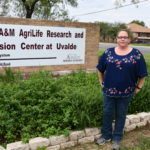Wildlife disease ecology specialist joins AgriLife center in Uvalde
Dr. Daniel Leskovar, 830-278-9151, [email protected]
Dr. Tammi Johnson, 830-278-9151 x242, [email protected]
UVALDE — Dr. Tammi Johnson has joined the Texas A&M AgriLife Research and Extension Center in Uvalde as its new Texas A&M AgriLife Research specialist in wildlife disease ecology.
Johnson, who began working at the center Oct. 1, will investigate various aspects of wildlife diseases, including disease vectors and bacterial pathogens, in addition to species distribution modeling and spatial ecology.

“Dr. Johnson has extensive wildlife-disease experience designing and implementing ecological research programs with a wide variety of collaborators and audiences,” said Dr. Daniel Leskovar, center director. “In her work, she has routinely collaborated with internal and external associates, including state and federal biologists, ecologists, epidemiologists, natural resource managers and university personnel.”
Leskovar said Johnson has specialized wildlife training as well as a variety of field, technical, laboratory and molecular skills.
“Her work here will be important in understanding how certain diseases that affect wildlife, livestock and possibly humans are vectored and transmitted,” Leskovar said. “This will be useful in helping ensure both animal and human health.”
Johnson has a doctorate in organismal biology and ecology from the University of Montana, a master’s degree in biology from Kansas State University and a bachelor’s degree in biology from the University of Mary. She also has a graduate certificate in geographic information science from Kansas State University.

Before coming to Texas A&M AgriLife, Johnson was an Oak Ridge Institute for Science and Education research fellow at the Division of Vector-borne Diseases of the Centers for Disease Control and Prevention. There she directed research projects which sought to characterize the tick populations and pathogens they vector, with the goal of informing land managers and the public of the risk of tick-borne diseases in parts of the midwestern and northeastern United States.
Johnson also assisted with a research project in the West Nile region of Uganda to help determine where people are coming into contact with fleas carrying the plague bacterium Yersinia pestis.
She also served as a postdoctoral research fellow for the American Society for Microbiology, as a biological technician for the U.S. Forest Service and as a global information systems research technician at Kansas State University.
“I’ve used my research and technical skills toward supporting various projects dealing with habitat alteration and disease dynamics in relation to group size,” she said. “Now I will apply those same skills toward helping landowners in this area make management decisions based on the information I can provide on diseases affecting wildlife and livestock and how they may impact human health.”


